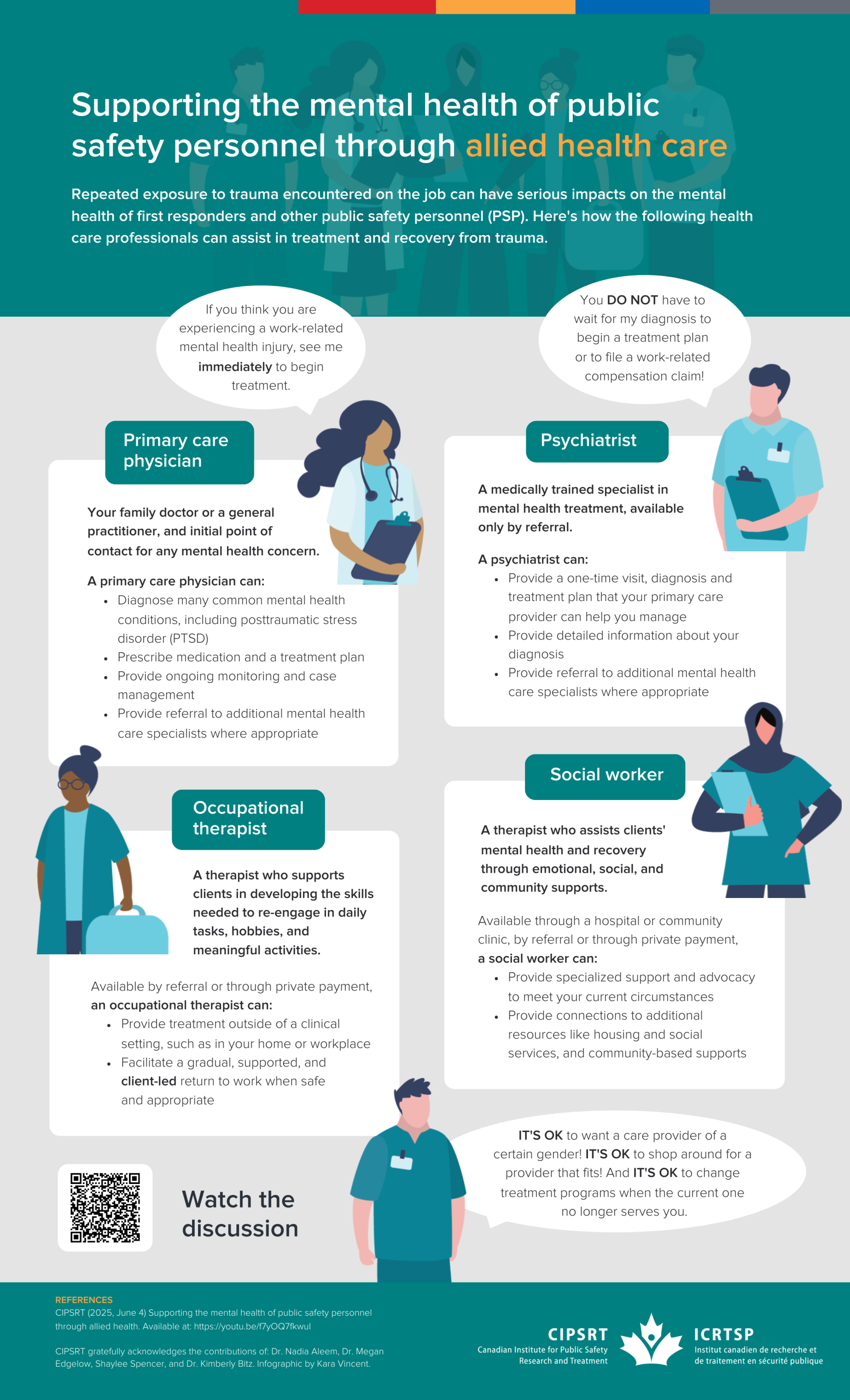Videos
What we learned
Objectives
Panelists discussed the different ways allied healthcare professionals can support the mental health and wellbeing of public safety personnel (PSP), as PSP are at a heightened risk of developing conditions like posttraumatic stress disorder (PTSD), depression, and anxiety. Allied health care professionals provide unique supports tailored to individual PSP.
Psychiatry
Psychiatrists can provide support by providing a diagnosis, creating a treatment plan, and provide education based on the diagnosis. Typically, access to psychiatrists is through a referral provided by a primary care physician. However, workers compensation boards may also assist in access to a psychiatrist. Referral to a psychiatrist is typically a one-time appointment with oversight of care then usually transferred to a primary care provider. Treatment provided by psychiatrists often involves medication; however, when symptoms do not respond to medication, alternative treatment approaches may be explored.
Occupational Therapy (OT)
Occupational therapists assist individuals through the use of meaningful activity as a therapeutic medium. Occupational therapists can support an individual in their home, workplace, and community by using trauma-informed frameworks to guide intervention. Support by an occupational therapist can be in the form of helping with routines, energy level, and daily responsibilities; re-engaging individuals in meaningful activities, and support in gradually returning to work. Occupational therapy can be accessed via public health care, privately via extended health coverage, and within Worker’s compensation systems. If you do not currently have access/referral to an occupational therapist through your Workers’ Compensation claim, you can request it through your case manager; likewise, if not offered via extended health coverage you can lobby your benefit provider for its inclusion.
Social Work
Social workers can assist individuals and families by providing direct support for mental, behavioural, and emotional disorders. They offer assessment, case conceptualization, and can recommend ongoing treatment modalities. They can also connect individuals and families to resources such as housing and social services and advocate for longer-term policy solutions. They often work within organizations such as schools, hospitals, and nonprofit organizations to provide community-level support. Social workers work within CIPSRT’s clinical arm, PSPNET to conduct research, program evaluation, and to implement ongoing improvements.
Key Takeaways
- Allied health professionals can provide resources and support for PSP mental health and wellbeing at every step of an individual’s mental health journey.
- Being proactive with mental health is important to overall wellbeing.
- You do NOT have to wait for a psychiatrist’s diagnosis (or any diagnosis) prior to beginning some form of treatment or prior to initiating a Workers’ Compensation claim
- A primary care physician can also provide a diagnosis and start you on medication
- If you are struggling with symptoms that you suspect are work-related, file a claim immediately as this is a gateway to accessing additional care
- OT has shown success working with PSP clients on tangible coping skills, daily activities, and on processes or skills that set them up for success upon returning to work
- PSPNET offers free, confidential, and accessible Internet-Delivered Cognitive Behavioural Therapy (iCBT) to PSP and their families through self and therapist guided courses on sleep, wellbeing, and PTSD. Prepared by Mackenzie Darling.
About this discussion
This discussion took place on June 4, 2025 and was presented by: Dr. Nadia Aleem, MD (Mental Health Lead Physician, Trillium Health Partners), Dr. Megan Edgelow, EdD (Associate Professor, School of Rehabilitation Therapy, Queen’s University), Shaylee Spencer, MSW, RSW (Clinical Operations Manager, CIPSRT), and moderated by Kimberly Bitz, DSc, OT. Reg. (Sask.) (Knowledge Mobilization Lead, CIPSRT).
Original event description:
Join us for an impactful and interactive session where allied health professionals share actionable strategies to boost mental wellness in the public safety personnel community. Open to all public safety personnel, families, policy makers, clinicians, and researchers.
Learn about early intervention, integrated care, and ways you can help support mental health.
